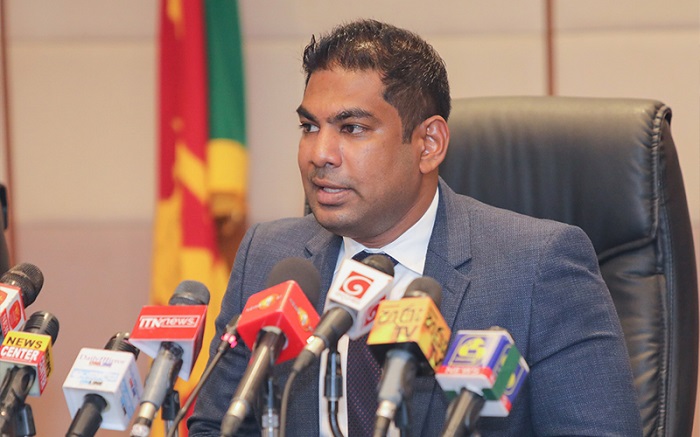
There are more than 4,000 vacancies within the Ceylon Electricity Board (CEB) and Ceylon Petroleum Corporation (CPC) at present, Minister of Power and Energy Kanchana Wijesekera said.
Minister Wijesekera said that, however, it is important to note that the current workforce is adequate to operate these institutions and deliver essential services.
“In the Petroleum Corporation, there are 3,292 approved staff positions, with 2,100 individuals currently employed, leaving 1,192 vacancies. Meanwhile, the Ceylon Electricity Board has 24,000 approved staff positions but only 21,000 employees are on the payroll. An additional 3,000 external hires have been brought in for specific service tasks, leaving a requirement for 3,000 more employees to reach the approved staff cadre,” he said.
Minister Wijesekera said that the current government has not taken steps to exploit these vacancies for political gain and, instead, has made unpopular but necessary decisions to promote the sustainable economic development of the country.
“It’s worth noting that although I could potentially offer employment to another thousand individuals from the Matara District within the Petroleum Corporation for political advantage, such a move is inconsistent with the government’s policy, which prioritizes the integrity of these institutions over political interests,” he said.
Minister Kanchana Wijesekera made this statement while participating in a conference on ‘Restructuring of Government Institutions for a New Development Approach’ held at the Ministry of Finance on Tuesday (Sep 26).
According to the President’s Media Division (PMD), this conference was held with the aim of informing various stakeholders, including trade union leaders, civil organization activists and journalists, about the necessary actions concerning loss-making state enterprises that pose a burden on the country’s struggling economy.
Also addressing the conference, the Director General of Trade Unions to the President, Saman Ratnapriya stated countries heavily involved in government business often lag behind in comparison to developed nations.
Ratnapriya emphasized the potential for delivering efficient and effective services through the restructuring of government institutions.
He pointed out that when examining developed countries worldwide; those nations where the government is less involved in business tend to have more developed economies, while countries heavily involved in government business often lag behind.
Revealing that an astounding Rs. 333 billion of public funds were expended from 2010 to 2020 to sustain the Sri Lanka Railway Department, Ratnapriya stressed that if this state-owned enterprise had been run as a profit-oriented business, it could have saved nearly Rs. 30 billion annually.
Responding to a query from a trade union leader about government intentions to restructure the health and education sectors, Ratnapriya indicated that there were no concrete plans for such actions.
He also disclosed that President Ranil Wickremesinghe had pledged to allocate one per cent more of the GDP next year to the health sector’s development compared to this year’s budget.
Speaking during the conference, former Head of the Department of Economics, University of Colombo, Professor Sirimal Abeyratne noted that restructuring plays a pivotal role in driving economic growth and it must be accompanied by positive transformations in areas like good governance, law enforcement and societal attitudes.
“State enterprises typically lack clear ownership structures and exhibit various shortcomings, including financial indiscipline, lack of transparency, inefficiency, resource wastage and corruption. These challenges are common to enterprises in many countries across the globe. Given this scenario, restructuring our country’s state enterprises becomes a catalyst for surmounting the prevailing economic crisis. Furthermore, there’s a compelling need to rally the workforce towards the betterment of the nation,” he added. (NewsWire)
